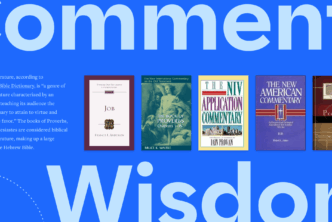A while back I was working on a project, and I needed help. I was looking for insights Bible readers have gained into Scripture by comparing English Bible translations. The lone rule was that you couldn’t know Greek or Hebrew.
I mentioned this request to an astute friend and diligent Bible student, a grandmother who works full time as a writer-editor. Super sharp. A day later I received this:
I read a passage this morning that might fit your search for translations that clarify text for me without my knowledge of the original languages. I’m not sure if this is the type of thing you are looking for, but it is a verse I would not have understood otherwise.
In Exodus 4:19 the Lord tells Moses to go to Egypt and gives directions, but in verse 24 I read that the Lord “sought to kill him.” So why would the Lord give an instruction followed by seeking his death?
The Amplified Bible adds text in brackets that helped me: “Now it happened at the lodging place, that the Lord met Moses and sought to kill him [making him deathly ill because he had not circumcised one of his sons].” Of all the versions I went to, this was the only one that added the reason. Accurate, you think?
I felt so honored that she would take time to respond to my request that I almost turned off my critical thinking skills and wrote back, “Awesome!” But—stupid critical thinking skills—I couldn’t. I had to probe.
Something seemed a little off. I remembered that passage in Exodus well; I’ve puzzled over it many times. It seemed to me, and I confirmed this with a quick check of a few translations and my Lexham English-Hebrew interlinear, that the Amplified Bible was adding its own ideas to the text.
Now there’s nothing wrong with speculation and interpolation as long as it’s clearly marked off (as the Amplified Bible does) and understood by the reader to be speculation and interpolation. It’s the latter I’m concerned about: I fear that some readers may assume that the things in brackets are sort of “hidden” in the Greek and Hebrew, waiting for the Amplified Bible to come along and unearth them for English readers who’ve been stuck with other, inferior translations. I believe this is what I thought as an 18-year-old picking up the Amplified for the first time.
But the things the Amplified Bible interpolates into Exodus 4:19 aren’t hidden in the Greek and Hebrew; they’re interpretive and explanatory glosses.
I asked my editor friend, “So . . . As an exceptionally astute reader yourself, did you feel it was clear to you where they were getting the one idea they added (the sickness) and the one they strengthened (the reason for the Lord’s desire to kill Moses)?”
My astute friend replied,
The brackets tell me this is added thought, but I did not know where the thought originated.
Uh-oh.
The preface to the Amplified Bible
This exchange got me thinking about the Amplified Bible. I bought a copy of this translation back in 1998. As a young college student, I didn’t quite know what to make of the Amplified. I didn’t quite understand what it was trying to do. It was just weird to read,
For God so greatly loved and dearly prized the world that He [even] gave up His only begotten (unique) Son, so that whoever believes in (trusts in, clings to, relies on) Him shall not perish (come to destruction, be lost) but have eternal (everlasting) life. (John 3:16)
It seemed to me that the Amplified was racking up synonyms from the English thesaurus. I guess that wouldn’t be so bad. The additions are, again, clearly marked off.
But it turns out the Amplified is shooting at a higher target.
What is the Amplified Bible?
The preface explains the Bible’s fulsome parenthetical interpolations:
[The Amplified Bible’s] genius lies in its rigorous attempt to go beyond the traditional “word-for-word” concept of translation to bring out the richness of the Hebrew and Greek languages. Its purpose is to reveal, together with the single English word equivalent to each key Hebrew and Greek word, any other clarifying meanings that may be concealed by the traditional translation method. Perhaps for the first time in an English version of the Bible, the full meaning of the key words in the original text is available for the reader. In a sense, the creative use of the amplification merely helps the reader comprehend what the Hebrew and Greek listener instinctively understood. (preface)
This, I’m afraid, is bad. Let me tell you why.
A linguistic warning about the Amplified Bible
In 1998 I hadn’t taken any linguistics courses, any Greek, or any Hebrew. If I read this preface, I don’t recall it raising any red flags. But now, after years of studying and compulsively thinking about language—particularly Greek, Hebrew, and English, and their relationship in Bible translation—I’m afraid the red flags wave madly when I read the Amplified Bible’s explanation of itself. Every line shows linguistic misunderstandings, and my critical thinking skills won’t let me say it more nicely.
Traditional translation methods aren’t “concealing” meaning except at very subtle levels—places in which, for example, the number of a second-person pronoun simply can’t be expressed except through context (because you can be singular or plural in English). In particular, “the key words in the original text” don’t have “full meanings” that our modern translations are somehow obscuring. The word “conceal” vastly overstates the limitations of traditional Bible translations.
Linguists such as James Barr have told us that the basic unit of meaning in language is not the word anyway. It hovers somewhere between the sentence and the paragraph. Therefore the Amplified’s preface is loading up Greek and Hebrew words with more meaning than they are meant to bear. Here it is again:
Take as an example the Greek word pisteuo, which the vast majority of versions render “believe.” That simple translation, however hardly does justice to the many meanings contained in the Greek pisteuo: “to adhere to, cleave to; to trust, to have faith in; to rely on, to depend on.” Consequently, the reader gains understanding through the use of amplification, as in John 11:25: “Jesus said to her, I am [Myself] the Resurrection and the Life. Whoever believes in (adheres to, trusts in, and relies on) Me, although he may die, yet he shall live.”
This really isn’t right. “Believes in” is the correct translation. Jesus could have said “adhered to” or “trusts in” or “relied on,” and he didn’t. Adhering, trusting, and relying are not ideas hidden in pisteuo (πιστεύω) but concealed by the ESV, NASB, NIV, CSB, etc. The Greek and Hebrew words for believe aren’t any richer than the English, French, Spanish, or German ones. Now, the word pisteuo (πιστεύω) may be used in contexts which highlight its affinity with “relying on” or “trusting in,” but so can the English word “believe.” It’s context which flavors a word.
I’m not saying that words can mean only one thing; words can indeed have various senses. I’m saying what respected evangelical linguist Moisés Silva says (quoting another scholar): “The best meaning is the least meaning.” Silva recommends that Bible interpreters (here he again quotes another scholar) define a word “in such fashion as to make it contribute least to the total message derivable from the passage where it is at home.” (Biblical Words and Their Meaning, 153–154).
In other words, if your translation of a Greek or Hebrew word radically changes the meaning of the passage from what the standard translations say, go back and check again until it doesn’t.
The Amplified, when used according to its stated design, invites readers to deny this interpretive truism. It makes them think, “Ah, now I know what the Greek word here really means”—and then to Choose Their Own Adventure, picking the meaning they like most. This kind of thinking undermines our excellent Bible translations. Who doesn’t want a Bible that tells you what really happened to Moses in that obscure, even troubling passage in Exodus 4? And if that information is hidden in the Hebrew, why not bring it out?
Because it isn’t there. Our conventional translations have already told us what Exodus 4:19 says.
Better in practice than in theory
Thankfully, however, the Amplified—like a fair amount of Bible teaching out there—is better in practice than in theory, and you should still own it. The fact is that Exodus 4:19 is obscure, and the Amplified’s guess at what was going on is a good one—a very good one that is attentive to the hints within the passage. Essentially, the Amplified Bible is a study Bible with very brief notes that are brought from the margins of the page into the text.
Not infrequently, the Amplified Bible uses a traditional translation of an obscure word such as “firmament” but then offers a rendering that will be easier for modern readers to grasp: “[expanse]” (Gen 1:7). That’s helpful.
The interpretive glosses it adds can also be downright insightful:
Let there be lights in the expanse of the heavens to separate the day from the night, and let them be signs and tokens [of God’s provident care]. (Gen 1:14)
I don’t think I ever stopped to ask myself in Genesis 1:14, “Signs and tokens of what?” The Amplified Bible forces me to ask that question by answering it: the sun, moon, and stars are signs and tokens of God’s providential care. And that looks to me like a good answer. Even if that answer is in no way hidden in the Hebrew, it’s a genuine Bible study help.
Even when the interpretive glosses are controversial, they’re still worth having for certain readers:
God said, Let Us [Father, Son, and Holy Spirit] make mankind in Our image (Gen 1:26).
Bible readers throughout church history have argued about whether the Trinity is meant here. I don’t think the question can be answered definitively until we know even as also we are known (1 Cor 13:12). But inserting one position into the text is helpful for readers who, like me as a young person, never stopped to ask, “Who’s the ‘us’?” Once again, the Amplified forces you to ask an important interpretive question by answering it.
The editor(s) of the Amplified knew they were guessing sometimes:
The gold of that land is of high quality; bdellium (pearl?) and onyx stone are there. (Gen 2:12)
They had an eye for metaphors that might need a little explanation. In this sense, the Amplified tends to combine the value of formal (literal) and functional (dynamic) Bible translations:
The eyes of all wait for You [looking, watching, and expecting] and You give them their food in due season. (Ps 145:15)
It is maximally efficient for a study Bible to stick little clarifications right in the text rather than forcing readers to follow a footnote down to the bottom of the page. If you don’t know who Cephas is, the Amplified helps you:
When Cephas (Peter) came to Antioch, I protested. (Gal 2:11)
All of the examples I’ve just given are good things the Amplified does despite, not because of, the theory stated in its preface.
Conclusion
Someone in your Bible study group sitting around your living room should have the Amplified Bible up on his or her iPad. Just skip the preface. I suggest that you view the Amplified as an efficient study Bible, the fruit of deep dedication to the text of Scripture, an interesting oddity of American evangelicalism that puts one of the movement’s healthiest impulses on full display: the desire to understand Scripture.





